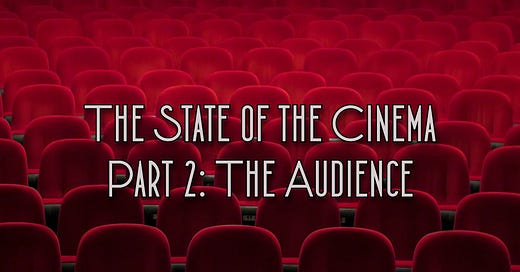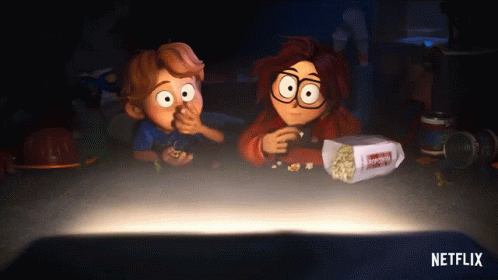Audience Courage:
Yesterday, I wrote about the ways that I think studios could help deliver better movies. Unfortunately, most of us are not the CEO of a major movie studio (except for you, David Zaslav, who I know was very quick to read yesterday’s piece). However, I think it is important to recognize that we, as movie-goers, have our part to play in this as well. So today, I want to talk about how we can influence our movie-going experience.
We Can Make Our Theaters Better
Out of the gate, I think we need to teach people how to watch a movie. Yes, I absolutely think that movie theaters should be responsible for enforcing things like phone usage and disruptive behavior, but the truth is, some kid being paid $12 an hour has enough going on without needing to confront a belligerent film-goer. And besides, I don’t want to miss part of a movie to go track down an employee to tell someone to shut up.
So don’t be afraid to be the person who tells people to be quiet or sit down or turn off their phone during a movie. Folks may bristle at being told to behave, but people also get embarrassed pretty easily and will stop being disruptive if someone tells them to stop it. I have been on both sides of that, and it works. Attention spans are shorter now than they have ever been, and a lot of people watch most of their movies at home, where they can scroll on their phone or talk to someone, and particularly following theater closures for COVID, that behavior has translated over to movie theaters. The simple act of turning to a fellow movie-goer and asking them to put down their phone or stop talking will almost certainly cause them to do that.
That doesn’t really do much to change what’s on the screen, and that brings me to my second point. We need to have the courage to change what’s on our screens.
We Get To Choose What We Watch
As a critic, I have access to film festivals and independent movies that not everyone gets to see. I recognize that and am grateful for it. But in the past few weeks, I have also seen two movies in my local theater in West Virginia, for which I have seen nary a trailer. My partner and I went to see Kneecap a few weeks ago, and this past weekend, we went to see Strange Darling. If you haven’t heard of those movies, that’s okay. I am pretty up on movies and I hadn’t heard of them either. And both were fantastic.
There is nothing at all wrong with wanting to see the blockbuster movies on a big screen with awesome sound. My favorite movie-going experiences have almost entirely been for the blockbusters when everyone is in a costume, we’re all excited, and the atmosphere is perfect. I will love the big, loud, popular IP theatrical experience. It is something to celebrate, and celebrate it I will.
That said, I also want you to scroll down to the bottom of your theater’s “now playing” list and see what movie only has one or two screenings a day. What’s the movie you haven’t heard of because you haven’t been bludgeoned by ads over the past six months? What’s the movie that was directed by a woman or a person of color or a queer person? What’s the very niche story that isn’t detailing your experience but might tell you something about your life anyway?
We need to attend those movies as well as the big blockbusters. The power to make some of these smaller movies successful lies in our hands as well as the hands of the studios. I loved Blink Twice, but honestly, Strange Darling was the better thriller (I’m linking to my TikTok since I don’t think I can write a proper review of it without spoiling it). And yes, it will be scary. We know what we’re going to get if we head into another comic book movie or the latest action film starring The Rock. We might not know what to expect if we take a chance on a movie without any big star power attached or a title we’ve never heard of. But as much as my favorite theatrical experiences have largely been for the blockbusters, my favorite movies have almost always been hidden gems that I’ve watched on a whim.
It won’t always work. I definitely have gone to see some small movies and left disappointed. However, that is far more rare for me than the times I’ve left a movie with a $200 million budget and thought that it was just fine. I am significantly more likely to find myself raving about a movie with a budget of around $10 million. And honestly, sometimes much, much lower than that.
If we want to see more original movies, we have to choose to see more original movies. That requires courage and a little bit of work. I’ll be honest: I get way more engagement when I write about big tentpole movies than when I write about small, independent movies. Because I am lucky enough to write for a newspaper, I am paid the same regardless of what kind of movie I write about, but that is not true for a lot of people. They are paid in clicks, and people aren’t out searching for movies they haven’t heard of, so they will keep writing about what pays the bills. There is no shade in that statement. Writing is work, and you need to figure out how to get paid.
That means you, as a consumer, will have to do some research. Find the critics who consistently review independent films and see what they are recommending. Make a list of film festival premieres and see what sounds interesting beyond the titles with the biggest stars. Then, contact your local theater and see if they are able to get some of those titles. Due to the way things work with contracts for certain movies to be on a specific number of screens, you probably won’t be able to get everything, but you might be able to push for the latest A24 or IFC Films movie to get a screening.
We Need to Diversify Our Screens
One more thing for my American readers, and this is one that I can improve on as well, is not to be afraid of films in languages that you don’t speak. Two of the best movies last year were Godzilla Minus One and Perfect Days. If we limit ourselves to stories only told in English, we are missing out on so many interesting stories that offer varying perspectives on the world but also connect us to one another. You may have to find these movies on streaming services - I recommend a library card and downloading Hoopla and Kanopy. They have an impressive array of independent and international films that will help you broaden your viewing experience.
The truth is, after about 2000 words on the subject, I’m not entirely sure that movies need to be fixed. Tons of movies are being made. Some are terrible. A lot are fine. And some are incredible. Some years will lean toward better, some years toward worse.
Ultimately, if we want to find movies outside of the mainstream, we might have to look outside of the mainstream. If we want a better movie-going experience, we might have to make our movie-going experiences better. But, like everything that requires effort and courage, it’s not something that we have to do alone. If we collectively make the decision to ask for more, I believe we can see that change happen. I’m excited to see what it will look like.









